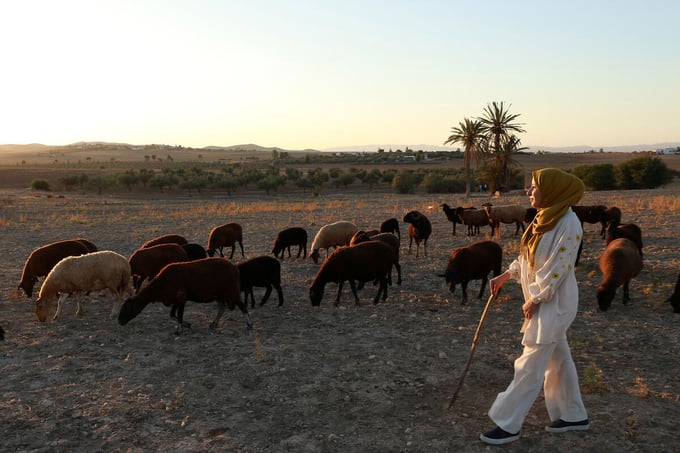May 16, 2025 | 10:35 GMT +7
May 16, 2025 | 10:35 GMT +7
Hotline: 0913.378.918
May 16, 2025 | 10:35 GMT +7
Hotline: 0913.378.918

Herding sheep in Tunisia.
The Food and Agriculture Organization of the United Nations (FAO) will co-lead the implementation of 21 new projects as part of the second round of funding from The Pandemic Fund. Aimed at enhancing global and local health security, these projects totalling $109 million, will benefit 32 countries across the world.
Four fast-tracked projects for mpox affected countries were announced in September, with 17 additional projects announced in October.
Over 50 percent of the funds awarded under this second round are for countries in sub-Saharan Africa – the region with the highest demand for Pandemic Fund grants.
Countries that will receive FAO support include Burundi, the Democratic Republic of Congo, and Rwanda where projects are fast-tracked to enhance health security through the One Health approach. This approach acknowledges the interdependence of human, animal, and environmental health.
Additional countries such as Chad, Egypt, Ghana, Indonesia, Jordan, Lebanon, Nicaragua, Pakistan, the Philippines, Samoa, Sierra Leone, South Africa, Sri Lanka, Tanzania, and Tunisia will also see significant investments with FAO support for pandemic preparedness. There will also be multi-country projects in Africa, Eastern Caribbean and in the South-East Asia region.
This funding round builds on the same priorities as in the first round, supporting more countries and regions, to strengthen priority technical areas such as collaborative surveillance, laboratory capacity, and workforce development. The funding also aims to strengthen cross-sector collaboration, leverage sustainable financing, and improve efficiency in pandemic prevention, preparedness, and response efforts.
The new projects will expand FAO's Pandemic Fund portfolio to 33 initiatives across its five regions—Africa, Asia-Pacific, Europe and Central Asia, Latin America and the Caribbean, and the Near East and North Africa—supporting 45 countries with a combined value of nearly $170 million.
To deliver, FAO is partnering with national governments, regional bodies and other Implementing Entities including the World Health Organization (WHO), the United Nations Children’s Fund (UNICEF), the World Bank (WB), and the Asian Development Bank (ADB). Government agencies and community based organizations (CBOs) will be among the critical delivery partners on the ground.
Launched in November 2022 during a G20 meeting, the Pandemic Fund, hosted by the World Bank Group, is the first multilateral financing mechanism dedicated to helping low-and middle-income countries become better prepared for future pandemics. It receives applications from countries, supported by accredited Implementing Entities such as FAO, and the Fund’s Governing Board agrees on finance allocations.
FAO’s role
FAO’s existing expertise in strengthening the core technical capacities of veterinary services, including in disease surveillance and laboratory diagnostics, will be a key asset in this second round of funding.
For example, FAO’s digital tools like EMA-i, inFARM, EMPRES-i, and alerts via SMS, allow fast reporting for mitigation and supports quality assurance and biosafety for animal health labs.
The Organization also has a strong track record of supporting veterinary laboratories and workforce development, including through the FAO Field Veterinary Epidemiology Training, which equips veterinary professionals to detect and respond early to emerging health threats.
Direct financial support from the Pandemic Fund catalyses further investments from national governments, development banks and international partners.
FAO and partners are now entering the final approval stage for the successful proposals, with full implementation expected to begin by early 2025.
(FAO)

(VAN) Fourth most important food crop in peril as Latin America and Caribbean suffer from slow-onset climate disaster.

(VAN) Shifting market dynamics and the noise around new legislation has propelled Trouw Nutrition’s research around early life nutrition in poultry. Today, it continues to be a key area of research.

(VAN) India is concerned about its food security and the livelihoods of its farmers if more US food imports are allowed.

(VAN) FAO's Director-General emphasises the need to work together to transform agrifood systems.

(VAN) Europe is facing its worst outbreak of foot-and-mouth since the start of the century.

(VAN) The central authorities, in early April, released a 10-year plan for rural vitalization.

(VAN) Viterra marked a significant milestone in its carbon measurement program in Argentina, called Ígaris, reaching 1 million soybean hectares measured.